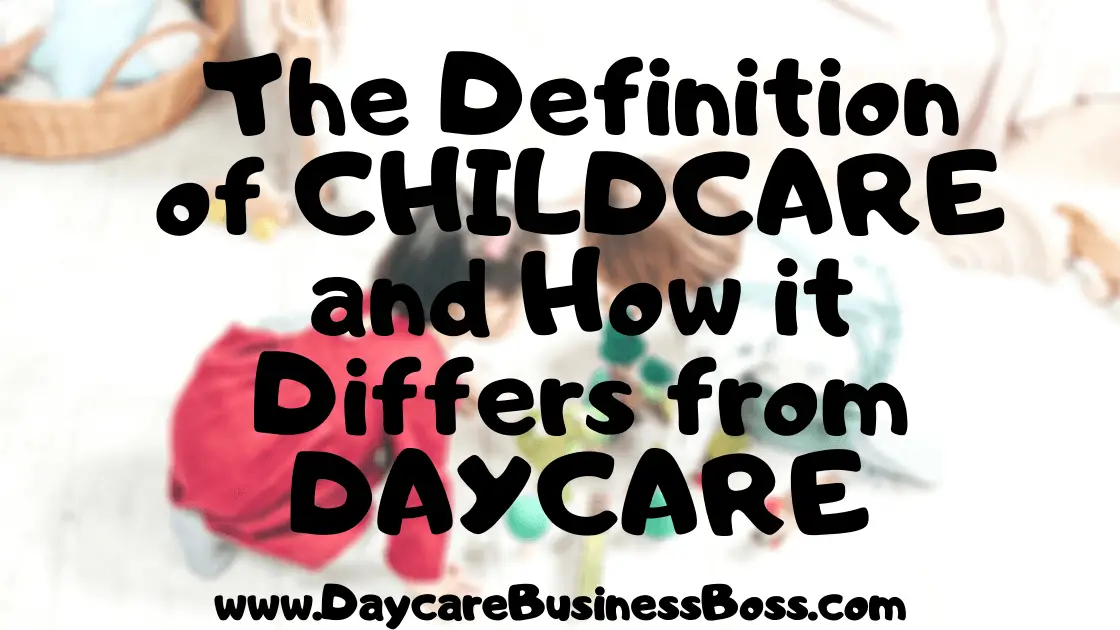Frequently used interchangeably, the terms childcare and daycare have significantly different connotations. Parents have one idea of what these terms mean, while early childhood educators have an often divergent understanding of the terms. Meanwhile, the general public thinks they mean about the same thing, taking care of kids for working parents.
The definition of childcare and how it differs from daycare comes down to what actions are being performed by the caregiver. Daycare is a word that has carried over from the days when both parents worked outside of the home and care was needed during the day. Childcare, on the other hand, focused on the care of the child. This term has been used in reference to the hiring of a nanny or babysitter to provide childcare in the home, often so parents could have a night out.
The profession of early childhood education has created a need to redefine these old terms to reflect what is being done in the field. By seeing these words in a new light, people will have a clearer understanding of them. This clarity will also benefit this fledgling profession that struggles to be taken seriously among other education professions.
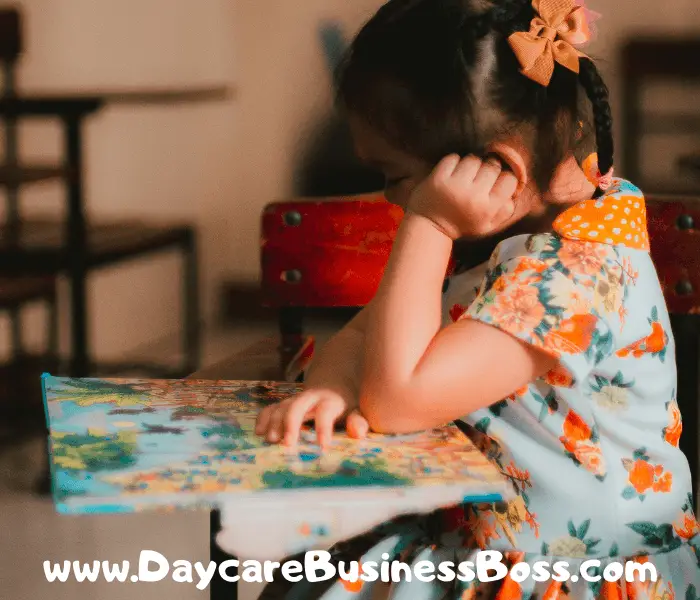
What Does Childcare Mean?
Taking care of a child, especially someone else’s, is a rigorous and challenging job. It involves meeting the basic needs of a tiny human who is entirely dependent on the caregiver. Childcare requires knowledge of how those needs will change over time and what adjustments to make.
Caring for a child includes providing adequate nutrition for healthy growth and development. It often means creating and following a schedule to assure plenty of activity time is in balance with essential sleep. Most importantly, childcare means keeping the safety and well-being of the child at the forefront.
Early childhood education professionals learn about the dietary needs of children to ensure they meet nutritional guidelines. They understand the importance of active lifestyles that enrich both physical and mental development. People who work in early childhood education choose to do so because they care about children.
In addition to physical health and safety, childcare has a nurturing aspect that is vital to mental health development. The importance of human contact during the first years of a child’s life became apparent upon the discovery of neglected orphans. Scientists determined that the underdevelopment of the children, both physical and mental, was due to lack of human contact.
Early childhood educators know how essential compassionate care is to the mental health of a child. They understand the impact tone of voice has on how kids respond. They also recognize the effects word choice can have on a child’s self-esteem.
Today’s childcare centers focus on meeting the developmental needs of the child instead of just being a convenience for working parents. They maintain an enriching environment that provides structure and routine. An environment that facilitates the health and wellness of each child as they progress through major milestones of growth, both physical and emotional.
Not every early childhood education center offers the same level of personal care. In addition, not every state has the same rules and regulations with regard to running a childcare facility. It is imperative as a parent to thoroughly research every potential childcare facility to ensure they meet your expectations of quality care.
How is Daycare Defined?
Some people think daycares are overpriced kid corrals filled with macaroni art and daily germ exchanges. Most parents who use daycares know they are a valuable asset and often become an extension of the family unit. Those who provide daycare know that truly caring for a child goes beyond meeting their basic human needs.
In today’s terms, daycare is the educational component of childcare. Much like preschool is for 3-5 year-olds, most daycare centers provide interactive learning environments for infants and toddlers, as well as preschool-aged children. Early childhood educators have discovered that hands-on learning at the earliest ages fosters a love for education as the child grows.
Early childhood education centers create more memorable learning experiences by incorporating the other senses beyond seeing and hearing. Young children’s minds will develop more synaptic connections from feeling the coldness of ice or smelling the sweetness of a flower. In turn, they will have a stronger connection to what they learn when they experience it first-hand.
Research in the field of early child development has shown the optimal time to learn many of our basic skills occurs from ages 0 to 6. The ability to learn multiple languages is strongest during these prime years. Early childhood educators know how important building a child’s vocabulary is to help grow their minds and improve their communication skills.
Exposure to shapes and numbers creates the foundation for developing math skills. Counting and patterns help introduce young minds to the intricacies of mathematics. Identifying colors and shapes not only adds vocabulary but introduces advanced subjects like geometry.
These education-filled childcare centers use music and dance as part of their teaching tools because young minds learn best when they’re bodies are moving. Little kids are not meant to sit still and listen for hours like older children can do. Early childhood educators know how to keep kids moving in a way that gets their minds laser-focused on the lesson at hand.
One of the most beneficial aspects of an early childhood education center is the social element it provides the child. Our personalities develop very early in life, so being engaged with peers can help shape and mold who we become. Learning how to cooperate with others and experiencing empathic life events in a safe environment leads to healthy personal relationships.
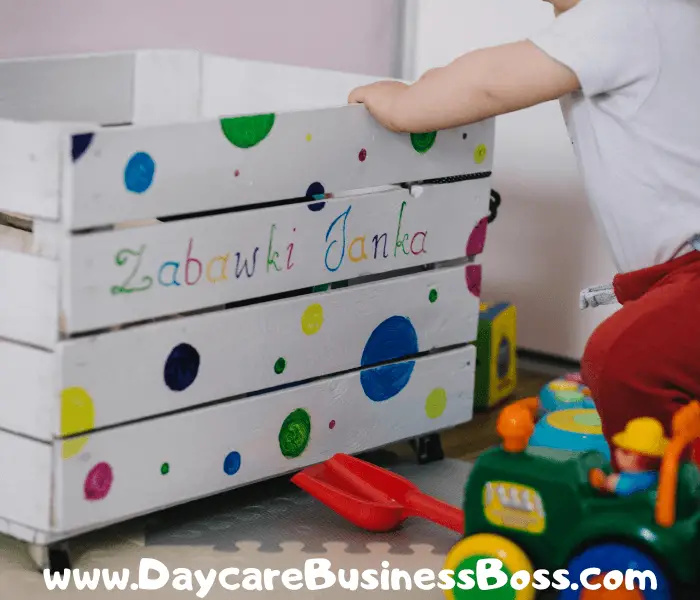
When Did Early Childhood Education Begin?
The theory of teaching children ages birth to eight-years-old emerged during the Age of Enlightenment in 17th and 18th century Europe. It was this intellectual and philosophical movement that coined the term nursery school. Additionally, many of the nursery rhymes still used today were written in the 18th century during this Age of Reason,
After sweeping across Europe, the notion of early childhood education made its appearance in the Western world throughout the 19th century. Pioneers of early childhood education were professionals outside of the field of education. Their expertise in child development gave them the insight needed to create effective teaching tools and curriculum.
Founders of Early Childhood Education
- Philosophy
- John Amos Comenius
- Revered as the Father of Modern Education
- Credited with the concept of picture books being written in the native language rather than Latin
- John Locke
- Theory of Tabula Rasa, empty mind: the belief that our self, who we are as a person, develops from our life experiences
- Association of ideas has the strongest impact when they occur during early childhood. Example: associating dark with fear
- Jean Jacques Rousseau
- Believed early childhood education should focus on developing a child’s personality and sense of social morality in order to become self-reliant
- Advocate for education being developmentally appropriate and divided childhood into three stages
- Age birth to 12 years – lead by impulses and emotions
- Age 12 to 16 years – reason begins to evolve
- Age 16 and beyond – develop into adulthood
- John Amos Comenius
- Curriculum and Methodology
- John Heinrich Pestalozzi
- Learning by head, hand, and heart
- Every factor in a child’s life plays a role in the development of personality, character, and the ability to reason creating particular desires and abilities.
- Friedrich Froebel
- Creator of kindergarten – education using songs, play, and activities of practical purpose
- Developed the first educational toys (Froebel gifts) consisting of wood blocks, beads, yarn, and dowels
- Maria Montessori
- First worked with mentally challenged children teaching them physical activities and sensory training using sights, smells, and touch
- Founded the Montessori Method based on her observations of a child’s spontaneous activity in an environment prepared to meet their needs.
- Rudolph Steiner
- Believed in holistic teaching that develops the child’s intellect, artistry, and skills.
- Education’s focus is on the child’s imagination and creativity.
- Supporting Scientific Research
- Sigmund Freud
- Experiences during early childhood greatly impact the development of behavior and personality
- Psychosexual stages of development: oral, anal, phallic, and latent
- Jean Piaget
- Theory of Cognitive Development that states mental processing progressively reorganizes as a result of experiences and maturation
- Four stages of cognitive development: sensorimotor, preoperational, concrete operational, and formal operational
- Eric Erickson
- Theory of Personality that consists of eight stages individuals pass through as they acquire the coinciding virtues
- Those virtues are hope, will, purpose, competence, fidelity, love, care, and wisdom.
- Sigmund Freud
- John Heinrich Pestalozzi
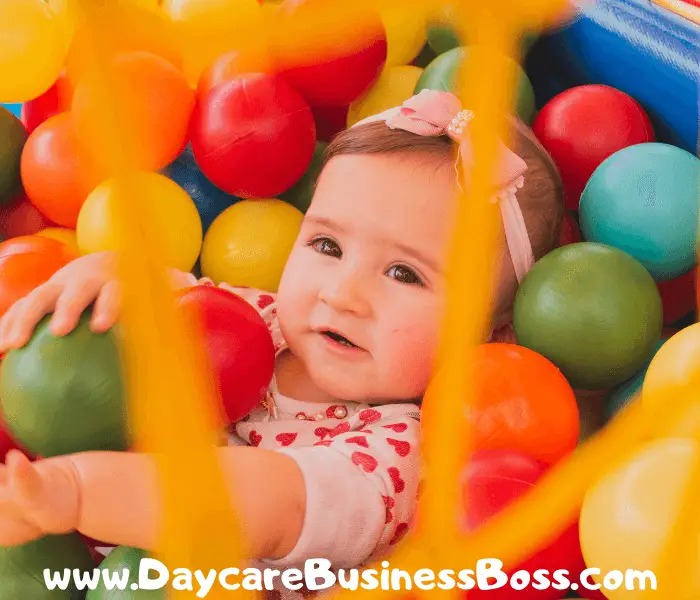
Early childhood education takes into account a child’s maturity, abilities, and interests and adjusts the curriculum accordingly. This differs greatly in how education developed at the elementary and secondary levels. There the curriculum is a one size fits all style of learning that focuses on the subject being taught rather than the needs of the learner.
The curriculum used in early childhood education is deeply rooted in solid philosophy. It has been created from proven theories and thorough research. Early childhood education has developed into a clearly outlined method of teaching young children that gets positive results.
In more recent years, early childhood education has been in the spotlight as a public policy issue. Lawmakers at the city, state, and federal levels debate on who, if anyone, should provide government funding to early childhood education institutions. Government funding of these facilities means government guidelines must be followed.
For example, in the state of Missouri, a licensed early childhood education center can qualify for financial assistance to purchase food for serving meals to the children. Nutrition guidelines must be followed and weekly menus are used to ensure food groups are being consumed in proper balance. Copies of the weekly menus and other documentation must be submitted regularly in order to maintain the funding.
Related Questions
- Is an early childhood education center the same as a preschool?
In most cases, the answer is no. While many early childhood centers do provide an educational aspect, they are not required to prepare kids for entering kindergarten. Preschools follow curriculums that teach school readiness skills of reading, writing, and math. Early childhood education merely introduces those concepts through activities and play with a focus on personal and social development.
- How has early childhood education affected kindergarten?
The 1960s program, Head Start inadvertently gave parents the idea education is a race and that more is better. As a result, the relaxed environment of half-day kindergarten, occurring in only 40% of the United States, became a full-day education requirement, nationwide. Now, kindergartens teach the spectrum of academia with testing and grades.
Please note: This blog post is for educational purposes only and does not constitute legal advice. Please consult a legal expert to address your specific needs.
Ready to start your childcare or daycare, you will be prepared our startup course and documents here.
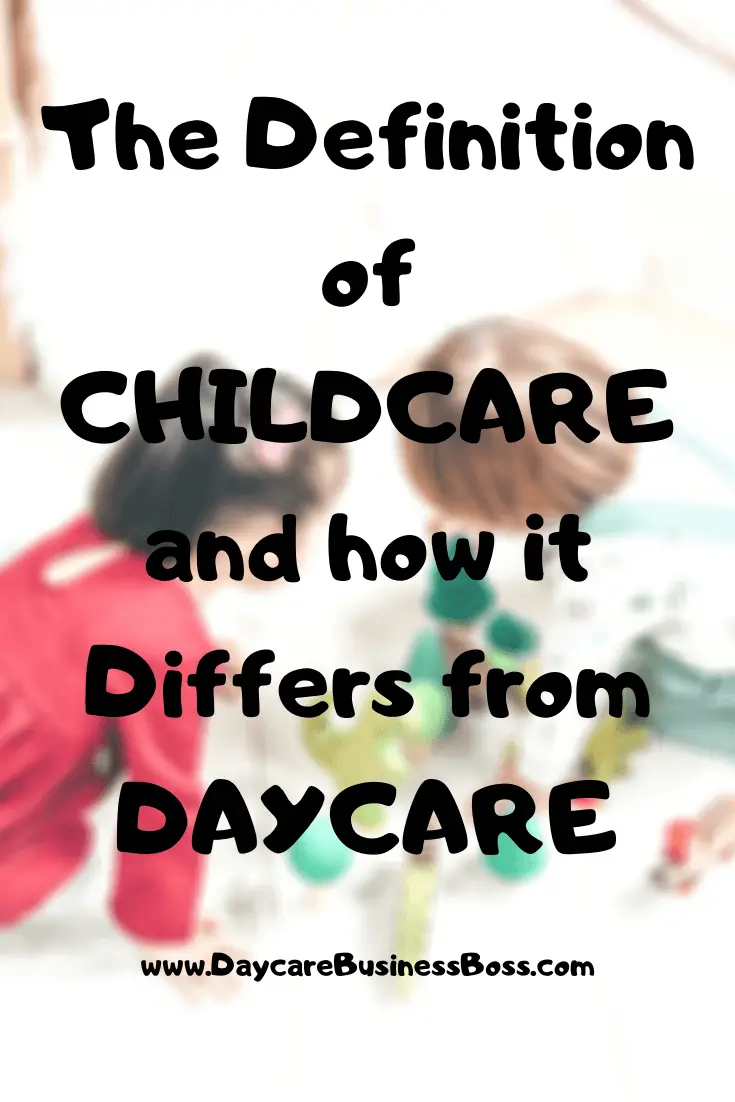

Meet Shawn Chun: Entrepreneur and Childcare Business Fan.
I’m a happy individual who happens to be an entrepreneur. I have owned several types of businesses in my life from a coffee shop to an import and export business to an online review business plus a few more and now I create online daycare business resources for those interested in starting new ventures. It’s demanding work but I love it. I do it for those passionate about their business and their goals. That’s why when I meet a childcare business owner, I see myself. I know how hard the struggle is to retain clients, find good employees and keep the business growing all while trying to stay competitive.
That’s why I created Daycare Business Boss: I want to help childcare business owners like you build a thriving business that brings you endless joy and supports your ideal lifestyle.

